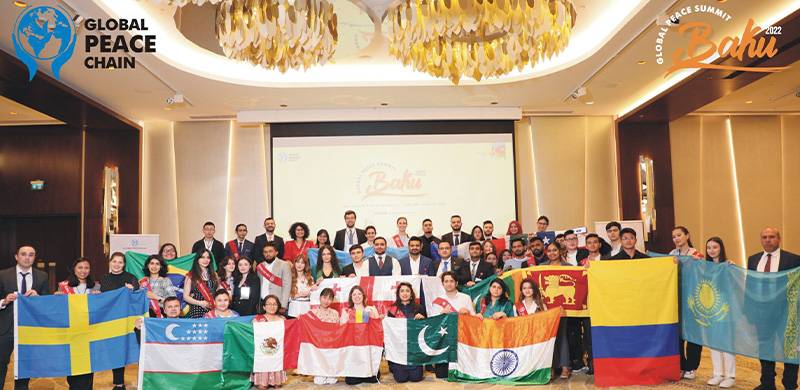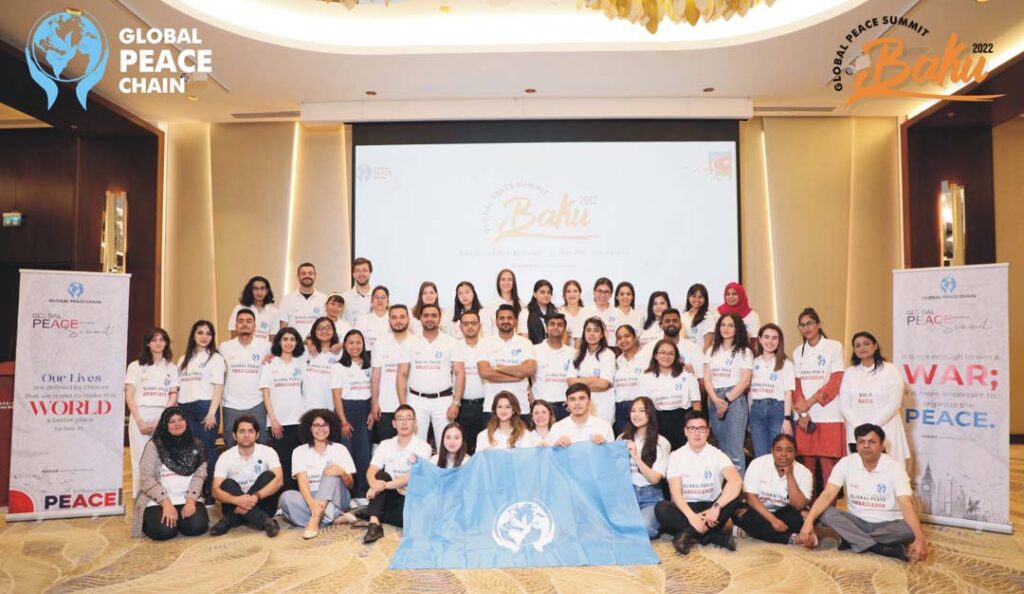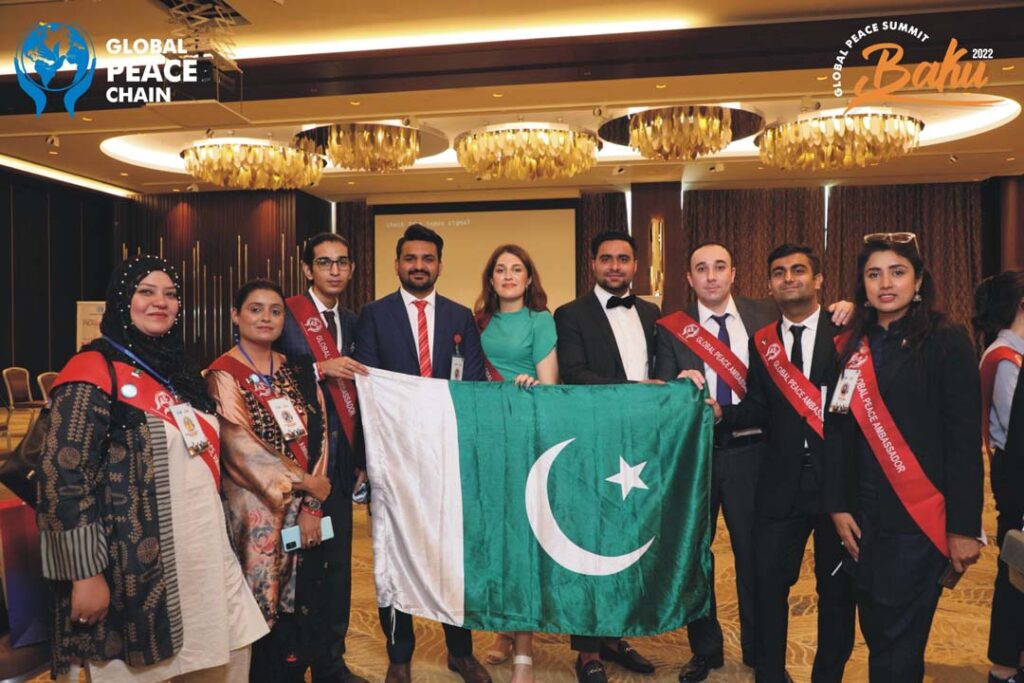
Last month, I attended a three-day summit to promote dialogue for global peace and inclusivity in Baku, Azerbaijan. More often than not, when I would introduce myself, people would assume I am from India, because my name implies I am Hindu.
The concept of nationhood encourages people to segregate themselves on the basis of religion, province, language, sect, and so on. This is strange to me because I strongly believe that your nationality should not be defined by your religion. Standing on that stage in Baku, wearing the green badge in front of an international audience, I was representing Pakistan before any other part of my identity. I proudly announced: “I am a Pakistani and a Hindu and I represent the white part of our flag.”
I will admit, however, that understanding how and where I fit in Pakistan was not always simple to me. At school age, I had never imagined a life beyond the boundaries of my hometown Kunri in rural Sindh. I was always in self-doubt because of being mocked at school for having a dark complexion. I was called “Teeli” for being underweight. My father’s big ambitions for my siblings and I moved us to metropolitan cities for better academic and social opportunities.
As a child, I avoided engaging in conversations related to diversity and inclusivity in the society. Because I am Hindu (a minority in Pakistan), my classmates from primary school would not share food or water with me. I was asked by a friend in high school to imagine my life if I were to convert to their religion. At university, an instructor loudly said in class, “Anyone can be a Bhagwan” when provoked by a student over a religious discussion. At my workplace, I was made to feel by a colleague that being a Hindu and a Pakistani is mutually exclusive.
My parents and I live in fear of someone in our family being forced to give up Hinduism. Often, we hear about cases of blasphemy when non-Muslims are wrongfully convicted or brutally lynched.
Standing up for myself and other minorities in Pakistan is something I learned later in life. I am the first person from my family to complete a bachelors, I was the only Hindu student in my college cohort, but I learned to stand up for myself because my personal struggles motivated me to work for inter-faith harmony.
I started small: at my university, I joined the Hum-Aahang and Dramatics societies and I organised Diwali, Christmas, and theatre events to promote dialogue. Presently, I use social media to talk about co-existence and creating safe spaces for minorities. I am enthusiastic about dancing and use that to express my struggles in life.
And then, to take my message to the next level, I opted for a platform like Global Peace Summit in Baku. With that passion for inter-faith harmony, I qualified as the only fully funded delegate from Pakistan to attend the summit.

The three-day summit involved activities. All of us, representing not just different cities and cultures but also different countries, connected instantly with belief and passion for social peace.
Tolerance, peace, and co-existence should not only be words of a dictionary. We as a nation need peace ambassadors who can start an open dialogue. We as the youth of the country need to look for ways to reimagine our lives without social prejudice.
The concept of creating a peace chain by bringing together young leaders from around the globe was brought into reality at the Global Peace Summit in Baku 2022 edition. It involved young people from more than 35 countries that gathered in Baku to speak about global problems, post-war peace opportunities, personal peace initiatives -- and they took part in panel discussions. I personally used the summit platform to discuss about the long-lasting issue of forced conversions in Pakistan and how minorities become a target of extremist groups on either side of the border.

Further, I talked about how social media is an illusion and real change for such issues will not come until they are discussed on political avenues, without governments’ involvement. Otherwise, there will be another day with another viral social media story of a minor Hindu girl being converted and married to a man of her father’s age or sometimes even more.
On the last day of the summit, we greeted each other in our cultural dresses, delegates talked about the social projects they had been part of, and displayed their cultural music and dance performances.
To move the audience, I performed on Tu Jhoom (by Abida Parveen and Naseebo Lal), followed by Pasoori (by Ali Sethi and Shae Gill). Then, we all gathered on the stage with ajraks and performed on Ho Jamalo, a Sindhi folk song.
It was the perfect way to showcase my beautiful country.
The concept of nationhood encourages people to segregate themselves on the basis of religion, province, language, sect, and so on. This is strange to me because I strongly believe that your nationality should not be defined by your religion. Standing on that stage in Baku, wearing the green badge in front of an international audience, I was representing Pakistan before any other part of my identity. I proudly announced: “I am a Pakistani and a Hindu and I represent the white part of our flag.”
I will admit, however, that understanding how and where I fit in Pakistan was not always simple to me. At school age, I had never imagined a life beyond the boundaries of my hometown Kunri in rural Sindh. I was always in self-doubt because of being mocked at school for having a dark complexion. I was called “Teeli” for being underweight. My father’s big ambitions for my siblings and I moved us to metropolitan cities for better academic and social opportunities.
As a child, I avoided engaging in conversations related to diversity and inclusivity in the society. Because I am Hindu (a minority in Pakistan), my classmates from primary school would not share food or water with me. I was asked by a friend in high school to imagine my life if I were to convert to their religion. At university, an instructor loudly said in class, “Anyone can be a Bhagwan” when provoked by a student over a religious discussion. At my workplace, I was made to feel by a colleague that being a Hindu and a Pakistani is mutually exclusive.
My parents and I live in fear of someone in our family being forced to give up Hinduism. Often, we hear about cases of blasphemy when non-Muslims are wrongfully convicted or brutally lynched.
I strongly believe that your nationality should not be defined by your religion. Standing on that stage in Baku, wearing the green badge in front of an international audience, I was representing Pakistan before any other part of my identity.
Standing up for myself and other minorities in Pakistan is something I learned later in life. I am the first person from my family to complete a bachelors, I was the only Hindu student in my college cohort, but I learned to stand up for myself because my personal struggles motivated me to work for inter-faith harmony.
I started small: at my university, I joined the Hum-Aahang and Dramatics societies and I organised Diwali, Christmas, and theatre events to promote dialogue. Presently, I use social media to talk about co-existence and creating safe spaces for minorities. I am enthusiastic about dancing and use that to express my struggles in life.
And then, to take my message to the next level, I opted for a platform like Global Peace Summit in Baku. With that passion for inter-faith harmony, I qualified as the only fully funded delegate from Pakistan to attend the summit.

The three-day summit involved activities. All of us, representing not just different cities and cultures but also different countries, connected instantly with belief and passion for social peace.
Tolerance, peace, and co-existence should not only be words of a dictionary. We as a nation need peace ambassadors who can start an open dialogue. We as the youth of the country need to look for ways to reimagine our lives without social prejudice.
I talked about how social media is an illusion and real change for such issues will not come until they are discussed on political avenues, without governments’ involvement.
The concept of creating a peace chain by bringing together young leaders from around the globe was brought into reality at the Global Peace Summit in Baku 2022 edition. It involved young people from more than 35 countries that gathered in Baku to speak about global problems, post-war peace opportunities, personal peace initiatives -- and they took part in panel discussions. I personally used the summit platform to discuss about the long-lasting issue of forced conversions in Pakistan and how minorities become a target of extremist groups on either side of the border.

Further, I talked about how social media is an illusion and real change for such issues will not come until they are discussed on political avenues, without governments’ involvement. Otherwise, there will be another day with another viral social media story of a minor Hindu girl being converted and married to a man of her father’s age or sometimes even more.
On the last day of the summit, we greeted each other in our cultural dresses, delegates talked about the social projects they had been part of, and displayed their cultural music and dance performances.
To move the audience, I performed on Tu Jhoom (by Abida Parveen and Naseebo Lal), followed by Pasoori (by Ali Sethi and Shae Gill). Then, we all gathered on the stage with ajraks and performed on Ho Jamalo, a Sindhi folk song.
It was the perfect way to showcase my beautiful country.

